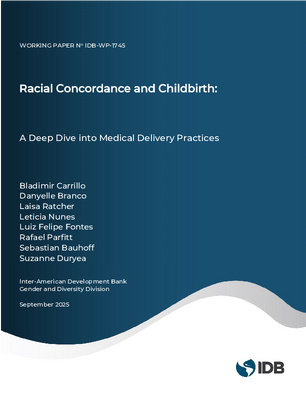Racial Concordance and Childbirth: A Deep Dive into Medical Delivery Practices
Date issued
Sep 2025
Subject
Health Facility;
Racial Discrimination;
Breastfeeding;
Race;
Public Health Care;
Health;
Population Aging;
Public Health;
Emergency Management;
Healthcare Access;
Health Care
JEL code
I12 - Health Behavior;
J13 - Fertility • Family Planning • Child Care • Children • Youth;
J15 - Economics of Minorities, Races, Indigenous Peoples, and Immigrants • Non-labor Discrimination;
I18 - Government Policy • Regulation • Public Health
Country
Brazil
Category
Working Papers
This paper examines the impact of racial concordance between mothers and healthcare providers on childbirth practices and health outcomes in Brazilian public hospitals. Using a novel dataset linking patients and providers across 15 million births, we compare deliveries where providers and patients share the same race to those where they do not. We find that racial concordance slightly increases vaginal delivery anesthesia use, emergency medication and modestly reduces cesarean section rates, tubal ligation, hospital stay length, and medical exams performed. We also find evidence that these effects are especially pronounced among Black mothers
attended by Black providers. Lastly, our results indicate no significant impacts on maternal or infant health outcomes. Our findings contribute to the literature on healthcare disparities by highlighting how racial concordance may improve care
delivery patterns without necessarily translating into immediate health outcome
differences.
attended by Black providers. Lastly, our results indicate no significant impacts on maternal or infant health outcomes. Our findings contribute to the literature on healthcare disparities by highlighting how racial concordance may improve care
delivery patterns without necessarily translating into immediate health outcome
differences.
NO


